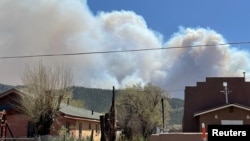Firefighters in New Mexico failed Friday to pin back the flames of the United States' largest wildfire, which is burning perilously close to a string of mountain villages.
The blaze is the most destructive of dozens in the U.S. Southwest that are more widespread and burning earlier than normal in the year due to climate change, scientists say.
Thousands of people in the Mora valley, about 64 kilometers northeast of Santa Fe, prepared to evacuate as smoke billowed from forest around the nearby farming community of Ledoux.
High winds blew embers over nearly 2 kilometers, spreading a wildfire that has scorched about 303 square kilometers, of the Sangre de Cristo Mountains since April 6, destroying hundreds of homes and structures.
"It looks very scary out there," incident commander Carl Schwope told a briefing. "With the rate of spread, it's very difficult for us to get any fire control."
Winds were expected to blow from the south on Saturday, pushing the blaze towards villages such as Mora, as well as the city of Las Vegas, with a population of 14,000, fire officials said.
"It's coming, and it's here," said Mora County sheriff's official Americk Padilla, urging residents to evacuate to the towns of Taos and Angel Fire if requested.
More than two decades of extreme drought have turned forested mountains and valleys into a tinderbox, said fire expert Stewart Turner.
"It's moving a lot faster than we anticipated," Turner said of the blaze. "This is a very, very serious fire."
Locals lashed out at the U.S. Forest Service for a deliberate, "controlled burn" meant to reduce fire risk that inadvertently started part of the blaze.
"The U.S. Forest Service needs to be held accountable," said Skip Finley, a former Mora County commissioner, as he loaded his car to evacuate his home.





